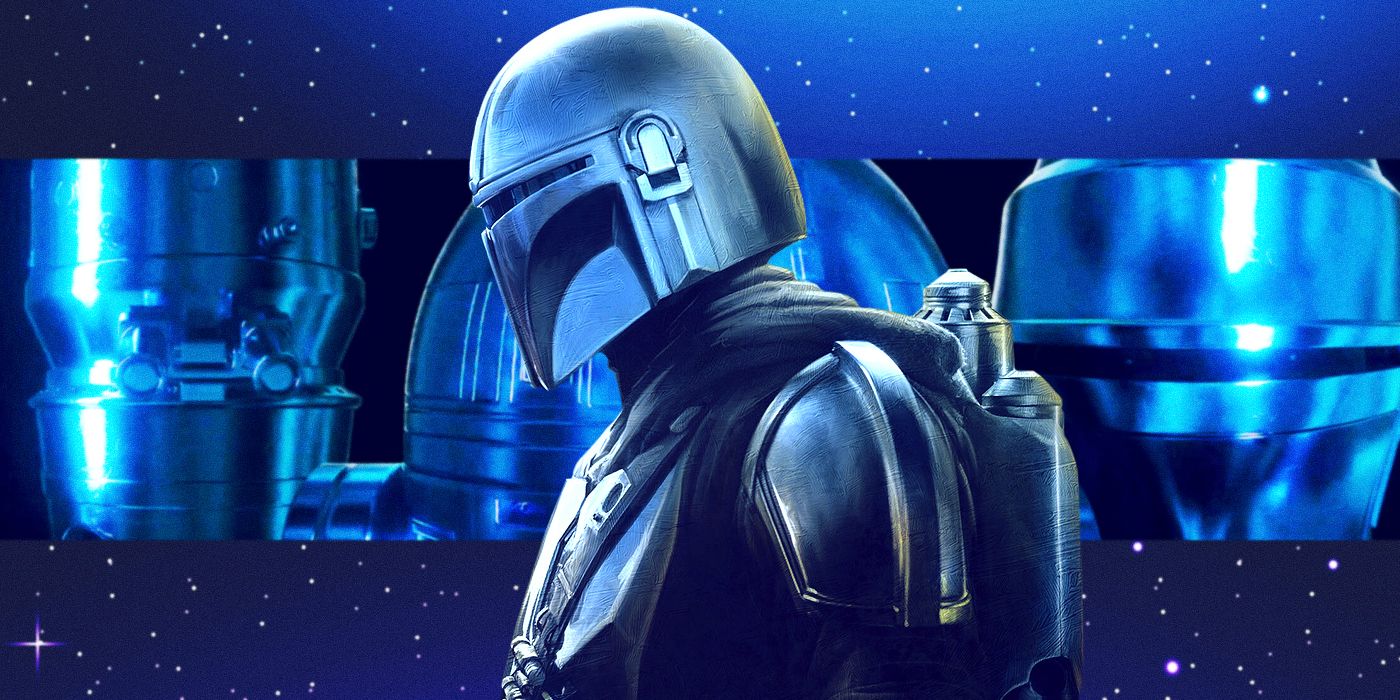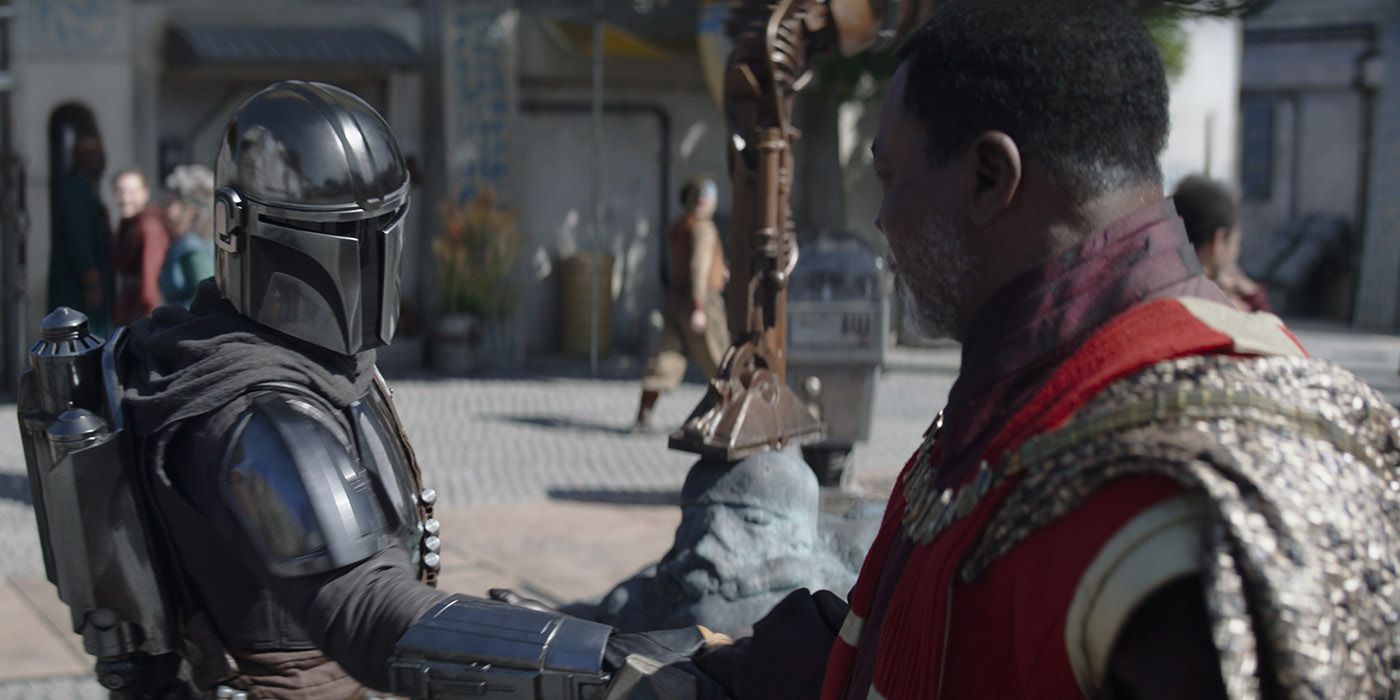Editor's Note: The following contains spoilers for The Mandalorian Season 3 Episode 1.
Since it first debuted in 2019, one of the best traits of The Mandalorian has been its ability to tie some of the loose ends in Star Wars, and now Season 3 continues that tradition, delving further into how the New Republic is trying to fill the void left by the Galactic Empire. Throughout the series, many hints are dropped that the new government is still struggling to be taken seriously in the galaxy, especially the Outer Rim, one of its most lawless corners and where most of the action on the Disney+ series takes place. The season premiere "The Apostate" continues that tradition, although somewhat subtly.
Din Djarin (Pedro Pascal) stops by Nevarro to visit now High Magistrate Greef Karga (Carl Weathers) and ask him to refurbish what used to be the droid IG-11 (Taika Waititi). As they talk about it, Karga offers Mando the position of Marshall in Nevarro, vacant since Cara Dune (Gina Carano) left to join the New Republic Special Forces. Our hero declines, suggesting that Karga should ask the New Republic to provide one, but Karga isn't open to that, saying he doesn't want to "bow down to yet another far-off bureaucracy," leaving his feelings towards the new galactic government clear.
What's Going On With the New Republic in 'The Mandalorian'?
The Mandalorian started off taking place around 5 years after the events of Return of the Jedi. According to creator Jon Favreau's timeline, around 3 years should have passed since then, putting it around 8 years after the conclusion of the original trilogy and 22 years before The Force Awakens. That's how long there is until the New Republic falls to the military might of the First Order, but, despite its best efforts, the new regime is already failing its citizens around the galaxy.
Healing a galaxy after a whole era of military authoritarian regime can't be easy, granted. The Empire has done a lot of damage, and the New Republic immediately started to act on some key aspects of how Palpatine (Ian McDiarmid) used to rule. First off was to establish a working democracy, which, in turn, required most of the institutions that existed prior to the Empire to be brought back. The core of the New Republic was led mostly by politicians who served in the Old Republic Senate and Clone Wars veterans, so they have the knowledge of what is necessary to build a democratic government from scratch. The first step was, of course, reforming the Galactic Senate, which elected former Rebel Alliance leader Mon Mothma (Genevieve O'Reilly) as its first Chancellor.
Mothma's transition from Rebellion leader to Chancellor was a natural one, but she has always been a politician and diplomat at heart and, even when she served in the Imperial Senate, she fiercely opposed Palpatine's military policy. The galaxy had been ravaged by two all-out wars in the last decades, so she took measures to address that directly by drastically reducing its Defense Corps. The New Republic doesn't have its own military, for example, and keeps the peace in the whole galaxy by relying on its Ranger patrols, like the one led by Carson Teva (Paul Sung-Hyung Lee), and by providing a Marshall to each planet upon request.
Another very important change made by the New Republic was establishing the end of Coruscant as Galactic Capital. Since both the Clone Wars and the Civil War had most of their battles take place in the Mid and Outer Rim, this measure seeks to bring planets and peoples who'd otherwise not have much contact with civic life closer to where the big decisions are taken. To that end, the capital was now on rotation, changing to a new planet every few years. When The Mandalorian starts, for example, agricultural planet Nakadia serves as Galactic Capital, following Chandrila's spell.
While the rotation of capital planet may seem like a good idea at first, in practical terms it mired the New Republic in a constant bureaucracy swamp. Bureaucracy, by the way, is precisely what made this new government so inefficient. To make up for the lack of military to enforce laws, the new institutions had an extensive due process in their justice system to ensure that everything went the right way. Remember Han Solo (Harrison Ford) taking a jab at Leia Organa (Carrie Fisher) in The Empire Strikes Back, saying they didn't have time to "discuss things in a committee"? Well, that's what ultimately happened to everything in the New Republic.
We Already Know How That Will End
Greef Karga's ill will towards the New Republic is easily explained if we remember that the Mid and Outer Rim of the galaxy were the most affected by decades of wars that, for the average citizen, seemed pointless. No one's life was improved by the rise of the Empire and, later that of the New Republic — quite the contrary, actually. So, what does it matter for them to have any ties with whoever is saying they're in charge in a far-away planet?
Right now, distant planets like Nevarro don't want anything to do with politics, because they're not likely to ever see the benefits of taking an active part in that arena. Even in terms of security, the most the New Republic is willing to do is to provide the grand total of one person to act as peacekeepers, or wandering Rangers who are never more than two. The lack of military force in these regions makes them ripe for attack and plunder by pirates and criminals, like we saw in Episode 1. The answer for them is to rely on their own people and keep their peace in their own way. That's precisely why Karga asks Mando to take over as Marshall in Nevarro: he's trustworthy, dependable, and a good man.
Also, we've already seen the problems the Rangers of the New Republic face being the sole form of peacekeeping. It's important to understand that "law enforcement" and "peacekeeping" are two very different concepts, and a Ranger simply can't handle the workload. In The Book of Boba Fett episode "Return of the Mandalorian," Carson Teva and a partner approach Mando as he was taking his new N1 Starfighter for a ride, but, instead of taking him in for piloting without a ship ID, opted for letting him leave. "Do you want to deal with the paperwork?" he asks his partner. "No, sir," is the obvious answer he gets.
The Empire ruled with an iron fist, and every planet was a subject to it. The New Republic's efforts to dismantle that whole apparatus makes a lot of sense, providing freedom to each system to manage itself. But for a government that still has galactic-wide aspirations, relying on bureaucracy and not taking an active part in keeping its own people safe is a huge mistake. A few decades later, the distrust these two directives will transform feelings like Karga's into distrust, opening the doors for the return of fascism through the First Order.
The first episode of Season 3 of The Mandalorian is currently available on Disney+. Episode 2 will air March 8.
Read More About 'The Mandalorian'
-
A Brief History of the Mandalorians in Star Wars
-
From 'Narcos' to 'The Mandalorian', the 9 Best Pedro Pascal Performances
-
How 'The Book of Boba Fett' Sets Up 'The Mandalorian' Season


